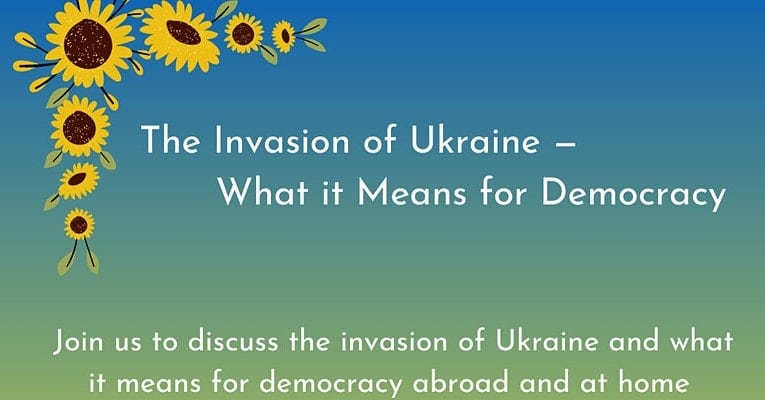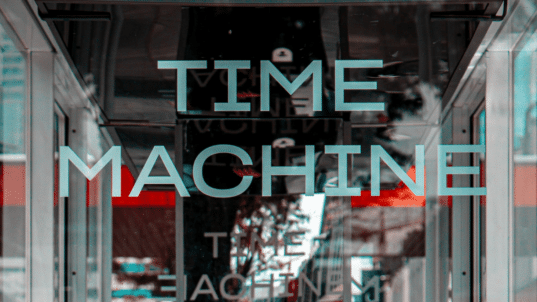
In the second of our three conversations exploring the Invasion of Ukraine & What it Means for Democracy, participants dug deeper into some of the major issues and concerns for this topic and focused on developing a sense of the core questions that we face. These are the key questions we’ll have to answer as we think of possibilities for moving forward—which is the focus for our upcoming third and final conversation.
Scroll down this page to see a summary of the core questions and issues discussed in this second session.
Looking ahead, what are some different possibilities for moving forward? In light of the core questions below, what productive answers can we generate together? What values or interests should shape our responses? Whether or not you were able to join us for either of the 1st or 2nd discussions, we encourage you to join us online for the 3rd and final session on Thursday, March 31st at 1 PM (ET). The online discussions are free and you can register via Eventbrite.
Here’s a summary of some of the core questions and ideas developed in this second session.
How can we better, more fully understand this war?
- What are the stated and underlying motivations of the different parties?
- Putin
- Extending Russian territorial and strategic ambitions, with greater regional control
- Assuming weakness of the US and other western democracies, as they have retracted from foreign engagement
- Burnishing his legacy as a “strong man” for Russia who saves civilization from the degeneracy of the West
- Restoring the “glory” of the Russian-Soviet empire
- Assuming Ukrainians would welcome invasion
- Other members of the Russian political power structure: governmental figures, oligarchs, the Russian people
- What independence or influence do they have?
- How do the people view the war—and what do they know and want?
- The Ukrainian people and their government
- Member states of NATO
- Other, non-aligned European countries, especially smaller ones closer to the war
- The United States, the government and the people: What actions will they support?
- Caution about military engagement due to the failures of past military interventions
- Caution about the inflationary effects and the ways that pocketbook concerns impact the politics of American voters
- Concern that US public has a short attention span for international issues
- Concern that the US public may support a strong response in the short term, but lose interest in the long term, especially as costs mount
- What are the key concerns and questions about military and foreign policy strategies?
- What if this becomes a nuclear war, and how can we avoid that?
- Concerns about the overarching existential threat posed by the presence of nuclear and chemical weapons and the increased sophistication and lethality of modern missile systems
- Concerns about escalating the conflict by providing too much aid balanced against concerns about doing nothing to prevent genocide
- Concerns about line-drawing for interventions like air cover, no-fly zones, airlifts, providing certain kinds of armaments but not others, etc.
- Concerns about whether “mutually assured destruction” still holds as a general deterrent to the use of nuclear weapons, or whether Putin might use tactical nuclear weapons (or bomb a Ukrainian nuclear power plant) if cornered
- How can the West best engage in “brinkmanship” to provide aid and balanced countermeasures?
- What if this already is WW III? How would we know? What would it look like?
- What about China? Will it become more directly involved to support Putin’s invasion?
- How should NATO engage and who decides? What if the European members want to respond more (or less) aggressively than the US to the invasion?
- What could be near-term or intermediate strategies that might reduce the genocide? For example—
- Unilateral declarations of escape corridors and times that will be protected via air power
- An air lift approach for medical supplies, food, water to besieged cities
- How do different political ideologies and forms of governance affect this war?
- Communism versus capitalism: communism saw the need for global expansion, the use(s) of violence and crises, versus more laissez-faire or deterministic theories about the ascendency of western democracies with some form of capitalism
- What if democracy needs to be part of a global, international movement, in order to thrive?
- Totalitarian rule versus democracy, with its checks and balances. What if there are no legal or practical limits on the exercise of power?
- How do mass communications, social media, the internet, etc., affect this war and what we know or think we know about it?
- The fog of war—where the first casualty of war is the truth
- It’s not solely “what is true,” but “what we think to be true” that determines what happens next in conflict like this
- How reliable is the information we’re getting? Or that the Russian people are getting? And how do we know?
- How is information and misinformation being weaponized in this war? What is the role of propaganda in this war as compared to prior conflicts?
- How does the speed and widespread availability of video and other messaging affect this war?
- What if this becomes a nuclear war, and how can we avoid that?
- Putin
What are our roles or responsibilities as democratic citizens and as a democratic nation?
- What should be the role of citizens in national security and foreign policy issues?
- When, where, how, and what kind of conversations should citizens be having about national security and foreign policy issues?
- How might we rightsize democratic participation in these issues?
- How do we make up for the lack of structures and processes to engage citizens and gather their input?
- What are the costs and consequences of excluding citizen input on these issues?
- Untested assumptions about the ease and speed of military victory and the effectiveness of military interventions
- Fighting the last war and other forms of ideological rigidity that don’t apply to new or different circumstances
- Normalizing violence as a response
- How can we better support and nurture the growth of democratic civil society—both here and abroad?
- More anticipatory thinking, more imagination, planning for the longer term
- What if we implement some form of national service for all citizens?
- Might this war for a fledgling democracy become a pivot point that spurs us to address some of the problems in our own democracy? Such as:
- Our lack of proportional representation and the enshrinement of minority rule via representation of states not people in the Senate and the Electoral College system
- The further distortions caused by gerrymandering, campaign contributions, and ongoing efforts to restrict access to the ballot
- Racism and the continued systemic exclusion of people of color and other minorities
- The corrosive effects of rampant individualism and consumerism on our democracy and on our ability to provide for even some minimal sense of the public good
- Could this be an opportunity to heal some of our internal polarization?
- Could it help to combat or deter some of the authoritarian movements here?
- As a nation with the most powerful military and national security apparatus, what are our responsibilities to the people of Ukraine, to the broader region, to US citizens, and to the rest of the world?
- What are our moral obligations—as democratic citizens and as a country?
- How much genocide are we willing to tolerate to avoid WW III?
- What is the cost to our own humanity of not acting, of doing nothing?
- What is the worse peril? Or how do we weigh two evils?
- What frameworks do we have for this type of discussion?
What might be the longer-term and unintended consequences of this war?
- Effects on Ukraine:
- How will the people recover? In what ways can they recover?
- The cultural devastation of Ukraine—the destruction of museums, the arts, and other cultural institutions
- Their long-term sense of cultural and national identity. How will they think of themselves after this?
- What will be the longer-term effects on the arts and culture elsewhere and more generally?
- What if we ban or continue to ban certain Russian literature, music, dance? What will be the effects?
- How will the arts respond to the war? How will the art that is produced be different?
- What will be the long-term mental health effects on children, refugees, veterans, Ukrainians, and the rest of the world?
- How will people be able to recapture some sense of security, of safety?
- How will people respond to the sudden change and long-term uncertainty imposed by this war?
- How might the trauma from this war affect how we respond to stress and make decisions?
- How can we help Ukrainian society and the rest of the world heal?
- What might be the long-term effects of an entire generation of traumatized and under-educated children?
- How might this affect other wars and conflicts? Will this lead to more or less war, or different types of war?
- What might be the ecological consequences? What if nuclear or chemical weapons are used?
- How might the war affect the world’s food supply and global food insecurity?
- On international relations
- How will this war affect US-China relations?
- More broadly, what if all countries turn toward more realism and self-interest
- How will it affect religion? How will the Russian Orthodox church’s support for the war affect its relations to other Christian churches and other religions?
- What might be the longer-term economic effects?
- On global supply chains and globalization generally? Will countries’ economies become more independent, isolationist, protectionist?
- On employment, individual and national incomes
- On energy production and supply
- On tourism and travel worldwide
- On migrations—both voluntary and involuntary (refugees)—and on host nations
- Effects on Russia
- What repercussions or punishments could or should there be, and on whom?
- How should or might the world hold Putin and/or Russia accountable? What would it look like to re-assimilate them into international politics and diplomacy?
- On regime change in Russia? Who will rule next and how?
- What will be the long-term effects on the Russian economy?
- What will be the long-term effects on the Russian people and their self-understanding as a nation? How might their national narrative change?



